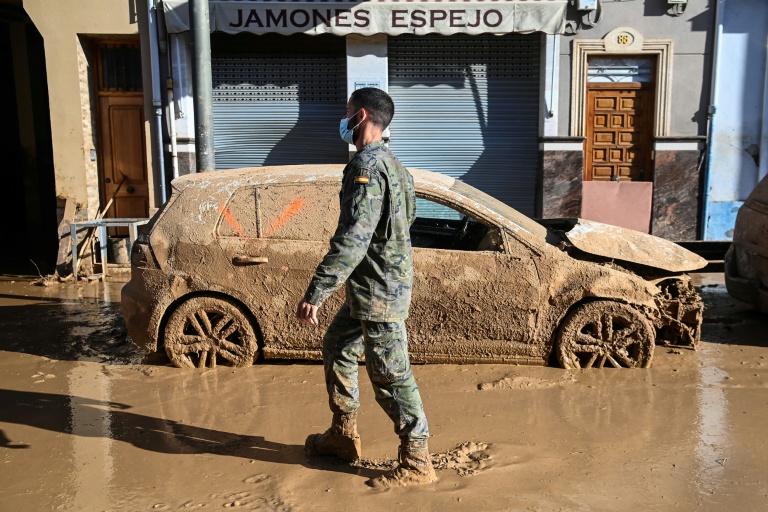Spain is grappling with the aftermath of devastating floods that have claimed over 200 lives, predominantly in the Valencia region, prompting King Felipe VI and Queen Letizia’s planned visit on Sunday. These floods, described by Prime Minister Pedro Sanchez as the worst natural disaster in the nation’s recent history, have wreaked havoc on towns and critical infrastructure, marking the second deadliest flooding incident in Europe this century. The government has mobilized a significant response, including a request from Valencia’s regional leader for additional military personnel, resulting in the deployment of 5,000 more troops, police, and civil guards, marking Spain’s largest peacetime military operation.
Despite these efforts, frustrations have surfaced among residents regarding the pace of the rescue and recovery operations. Many areas remain isolated, lacking essential supplies of food, water, and power since the floods struck. Sanchez acknowledged the shortcomings in the response, emphasizing the urgent need to improve the system. Reports from affected towns such as Alfafar and Sedavi indicate that local citizens have taken it upon themselves to clear mud and debris, while firefighters work tirelessly to restore some semblance of normalcy. The recognition of this disaster’s scale has raised questions about the adequacy of the warning systems prior to the flood and the overall governmental response.
In an effort to restore order and provide necessary aid to the devastated regions, access to certain roads has been restricted for emergency services. The damage to telephone and transportation networks complicates the determination of the exact number of individuals still missing, leaving many families anxious for updates. While electricity has been restored to a significant percentage of homes, and some major motorways have reopened, knowledge about the full extent of destruction and accessibility of affected towns remains murky, with local roads severely damaged.
Community solidarity has emerged as a silver lining amidst the destruction, with many citizens independently organizing support efforts. An estimated 1,000 volunteers have converged from Valencia to assist towns that have been ravaged. This grassroots movement highlights a collective resilience as residents rally together to provide essential items like food and water. Affected individuals express despair over the widespread loss, with sentiments echoing the desire for immediate help from officials rather than mere promises from politicians.
The regional leader, Carlos Mazon, deemed the floods as “the worst moment in our history” and has put forward proposals aimed at recovery, looking to address infrastructure needs and economic support for the impacted area. As the royal visit and the presence of Prime Minister Sanchez draw near, these plans are likely to be underlined, emphasizing the urgency for a coordinated recovery effort. The catastrophic floods serve as a reminder of the unpredictable nature of severe weather, as climate scientists point to the influence of climate change in exacerbating these events.
Ultimately, as rescue operations continue and the body count rises — with 213 confirmed fatalities reported, including 210 in Valencia — the hope for survival diminishes with each passing day. With authorities closely monitoring the situation and adapting their response as needed, the road to recovery for the affected communities will be long and arduous. The devastation left in the wake of the floods is a call to action for strengthening disaster preparedness and response mechanisms to better handle similar crises in the future, ensuring that lives and livelihoods can be effectively safeguarded.

